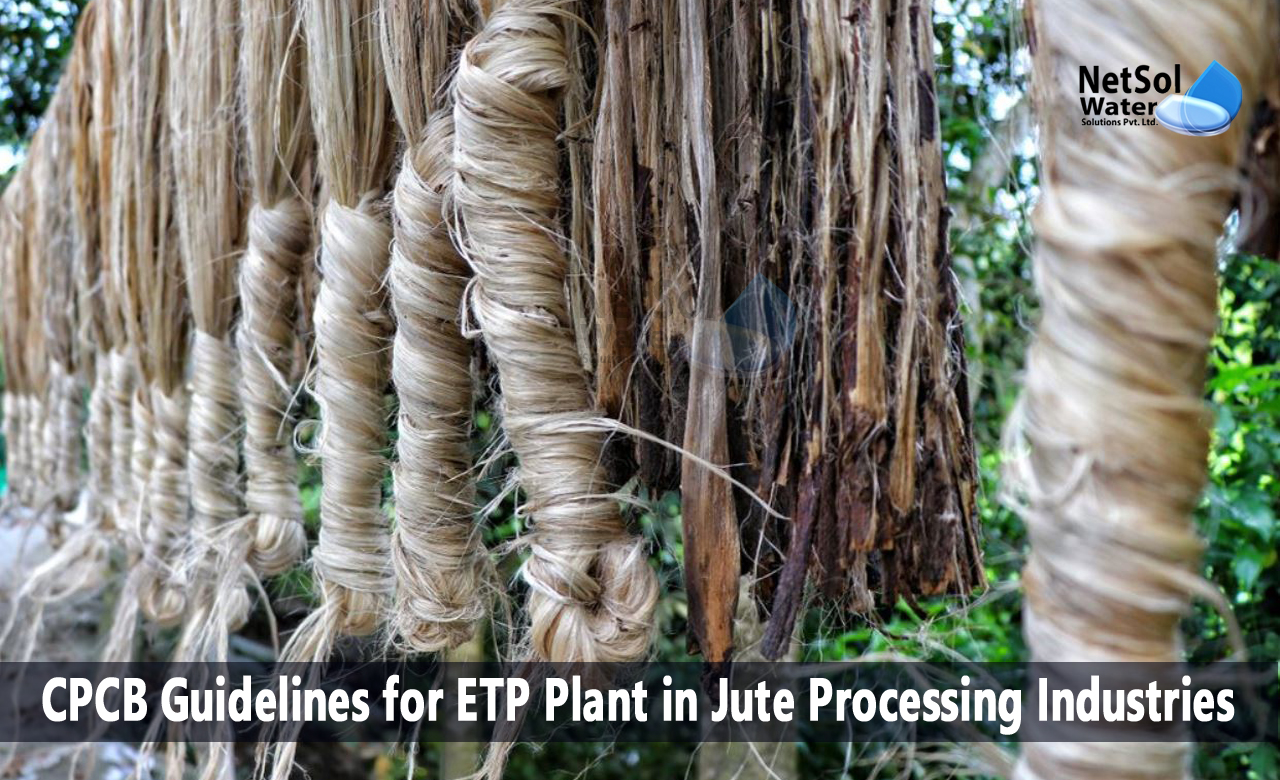As companies grow quickly, more and more dangerous pollutants and poisons are released into the environment, posing substantial risks to the environment, particularly water pollution, which is a major worry.
Jute processing industries uses large amounts of water and produces huge volumes of wastewater. As a result, it is necessary to establish effluent treatment plants in jute processing industries, to reduce the amount of toxic wastewater discharged into the river bodies.
CPCB Guidelines for ETP Plant in Jute Processing Industries
Wastewater treatment systems are crucial in jute processing industries, because they produce effluents with highly variable compositions. Therefore, the greatest alternative for a safe environment is an effluent treatment plant, which also saves money and the environment, while providing excellent treatment effectiveness.
|
Effluent
pH |
Concentration in mg/l, except pH & water consumption
5.5-9 |
|
BOD (3 days at 27oC) Oil & Grease Suspended solids Water Consumption |
30 10 100 1.6 cum/tonne of product produced |
Note: No limit of color given for liquid effluent.
Treatment of jute processing industry wastewater
· Screening
It is the initial unit operation in an ETP. The wastewater's coarser materials are retained by the screen, a perforated device. The solid materials stack when they come into contact with the screen, and are then removed either manually or mechanically. This method is known as screening.
· Flow Equalization
A method called flow equalisation is utilised to speed up the downstream process, and lessen operational issues brought on by flow variances. It also serves as an emergency tank to balance the effluent in the event of a treatment process failure. It guarantees that the effluent flows at a steady or almost constant rate.
· Coagulation
It happens really quickly in rapid mix basins. The quick mix basin's main job is to spread the coagulant around, so that it contacts all of the effluents.
· Flocculation
Aggregates are created from the finely divided material. In two different techniques, wastewater is flocculated, a mechanical one and an agitating one. It is usual practise to taper the energy input in mechanical and air agitation systems, so that the aggregates initially generated won't be broken when they depart the flocculation facilities.
· Neutralization
In most cases, the acidic or alkaline components in industrial wastewater need to be neutralised, before disposal or treatment. In particular, lime and sulphuric acid are utilized to neutralise the effluent.
· Clarification
Solids are eliminated from this process before the biological one. It is the most economical approach to eliminate these materials, after the initial screening. Skimmers remove floatable solids from the surface of the clarifier tank's interior, as settleable solids are gathered at the bottom by a rack and removed by a sludge removal system.
· Biological treatment
For the treatment of wastewater, numerous biological techniques are employed. There are five main categories of processes: aerobic, anoxic, anaerobic, and combination of aerobic, anoxic, and anaerobic processes.
Advantages of ETPs in Jute processing Industries
ETP significantly reduces environmental harm while simultaneously generating advantages for the sector. There are numerous benefits of ETP:
1. It can guarantee that you are following all environmental laws and regulations.
2. It recycles or transforms wastewater into pure, secure, and useable water.
3. It is the finest strategy to lessen waste generated on your property.
4. It helps the environment by eliminating dangerous pollutants and toxins.
5. A properly maintained ETP will enable you to make long-term financial savings.
Conclusion
Untreated effluent from various sections has significant concentrations of TSS, dyes, chemicals & auxiliaries, metal toxicants, and BOD, all of which need to be treated before being released into the environment.
Pollutants are eliminated and water quality is raised to an acceptable or standard level, during the ETP process, enabling risk-free final release to the environment.
Effluent treatment plant manufacturer for jute processing industries
Netsol Water offer a wide range of specialized services, including design, installation, and commissioning, for the effluent treatment plants. In order to assist you satisfy quality standards in the jute manufacturing processes, and deliver the greatest output, our engineering team collaborates with your team. We offer practical solutions at very affordable prices, whether cooling tower water treatment, boiler water treatment, zero discharge, or other types of filtrations.
Netsol Water is Greater Noida-based leading water & wastewater treatment plant manufacturer. We are industry's most demanding company based on client review and work quality. We are known as best commercial RO plant manufacturers, industrial RO plant manufacturer, sewage treatment plant manufacturer, Water Softener Plant Manufacturers and effluent treatment plant manufacturers. Apart from this 24x7 customer support is our USP. Call on +91-9650608473, or write us at enquiry@netsolwater.com for any support, inquiry or product-purchase related query.



